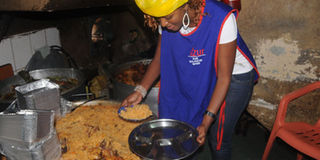Reaping from tasty pilau rice

One of the employees serves pilau. Uhuru restaurant is one of the oldest eateries in Kampala. Photo by Eddie Chicco
What you need to know:
The experience. As you dine at Uhuru restaurant, it is probable that you’ll keep hoping your meal never comes to an end.
Uhuru restaurant’s story is as old as independent Uganda. On October 9, 1962, while Uganda attained self rule from the British, Uhuru restaurant - that is famous for pilau rice - started. The Swahili name accorded to the food café literally means independence. And 50 years later, it has grown into a successful eatery.
Uhuru restaurant, like any successful business, has withstood some challenges to get to where it is today. But what stood Uhuru in good stead is apt management and consistency in providing quality services.
Key to success
From the founder Mr Hassan Araft Uhuru, to the current manager Mr Salim Uhuru Saad who also doubles as LC 5 Councillor of Kisenyi, good staff relations later exhibited through good service is what makes a manager tick.
“I do not act bossy. My workers are my colleagues which makes them free with me to teach them how to cook. This then culminates into good service for my customers.”
His restaurant ranks highly among the most visited eateries particularly for its ‘pilau’ rice. Other snacks include mandazi, chapatti and also birian—his newest dish— which, according to Uhuru, is a combination of several meats and foods appreciated by many Ugandans.
“My father came from Dar-es-salaam to open a restaurant in Uganda. By coincidence, he opened it in October when Uganda was getting independence,” says Salim ‘Uhuru’ Saad, the proprietor of three other restaurants established under the same name.
The lavish outlet, located at Blue Corner, next to Nakivubo Stadium was opened by then Governor Andrew Cohen, giving it the impetus it needed to flourish.
With over 20 employees, business was good. Uhuru became and is still one of the most famous restaurants because whoever wanted a plate of rice was convinced that Uhuru was the place to be, just like it still is today.
“The clientele was a mixed class. We had people from the professional class and others from the lower classes. It was open for everybody,” Saad says.
Cars of all types at the time, for example VW Beetles, Ford Cortina, Vauxhuals, Peugot 204, crammed the small parking lot.
The business survived the wrath of all regimes including that of the dictator Idi Amin Dada. “Even when Amin chased the Indians away, we stayed because we are Arabs,” Saad remembers.
The place to be
Uhuru became the breakfast and lunch meeting point of top people in Amin’s regime. Top soldiers like Juma Butabika, Moses Ali and Nassur all had their food at Uhuru. “But the most memorable day was when Palestinian leader Yasser Arafat visited Uganda. Uhuru was selected as the restaurant to cook his food,” Saad says.
However, when Amin was overthrown in 1979, the restaurant had to close for sometime due to chaos that rocked the city, leaving some people up in their houses.
“Sometimes, rice got stale because no one came to our restaurant in those difficult times,” Saad says. When Museveni came to power in 1986, business regained.
“While Museveni was working hard to bring Uganda back on track, so were the Uhuru restaurant proprietors,” he told Prosper magazine.
Salim Saad picked the business from his father in 1993. As the only interested child in the food sector, while other children ventured elsewhere, he took over the mantle and carried the restaurant business forward.
“I am the last born of six but my father entrusted me with the business. I love it, I don’t despise it because it has been a child hood business in which I got involved at a tender age I want to see it grow, and I invest all my energies, money and time in it,”Mr Saad said.
Having started out with one branch in Kisenyi, Uhuru restaurant had a varied cuisine on offer but it later became famous for its pilau rice.
The secret
Asked about the secret to his delicacy, Mr Saad said that rice, which has made his restaurant popular, is a dish he has maintained, for the art of making it is in-born; “I learnt the formular of making it from my father. That is why often times I make it myself because no one else can cook it like me.”
He has over the years branched out into three other Uhuru restaurants to accommodate the surging number of customers. The first one is located at Blue Corner, next to Nakivubo stadium in Kisenyi. The other three are on Wilson road, Kafumbe Mukasa road near Qualicel bus terminal and Zibula Atudde road.
And for this number of restaurants, the customer base has increased from a mere 100 people daily to over 500 people in all the restaurants.
The 37-year-old Hadija Mukwaya who Prosper magazine found enjoying a meal at the restaurant on Wilson road described her special attachment to this food. Every day, she walks from her work place to have a meal at there.
“I trust their hygiene; the quality of their food is superb. For the many years I have come here to get pilau, I have never been disappointed,” she told Prosper magazine.
Future prospects
Mr Saad is still on the lookout for new revenue streams with a new branch in the offing come next year.
Unfortunately, the eatery got its footprint within Kampala only after Mr Saad’s first attempt to open one in Jinja did not yield fruit.
“Someone took it on as his own; cooked poor quality dishes yet he kept running under my name. I do not entertain such nonsense. So, I pulled out immediately.”
He however says there are plans to establish others and he intends to keep the colour, size, seating arrangement and the food quality uniform.
Mr Saad also says there are plans to acquire their own building that will house all the restaurants. This is a decision taken, following the exorbitant rental fees that were almost eating into the profits.
Market prices for other products, particularly rice are also high. Mr Uhuru says he imports most of his products in order to save some money for himself.
“I import my rice from Dubai because it is cheaper and better. On the Uganda market, the supply is limited, poor quality and very expensive. I get a single kilogramme at about Shs8,000, a price that is way cheaper than Uganda’ s market prices.
Of every about 500 customers who buy pilau, where each plate costs Shs5,000, he makes over Shs2.5m in sales on a good day.




